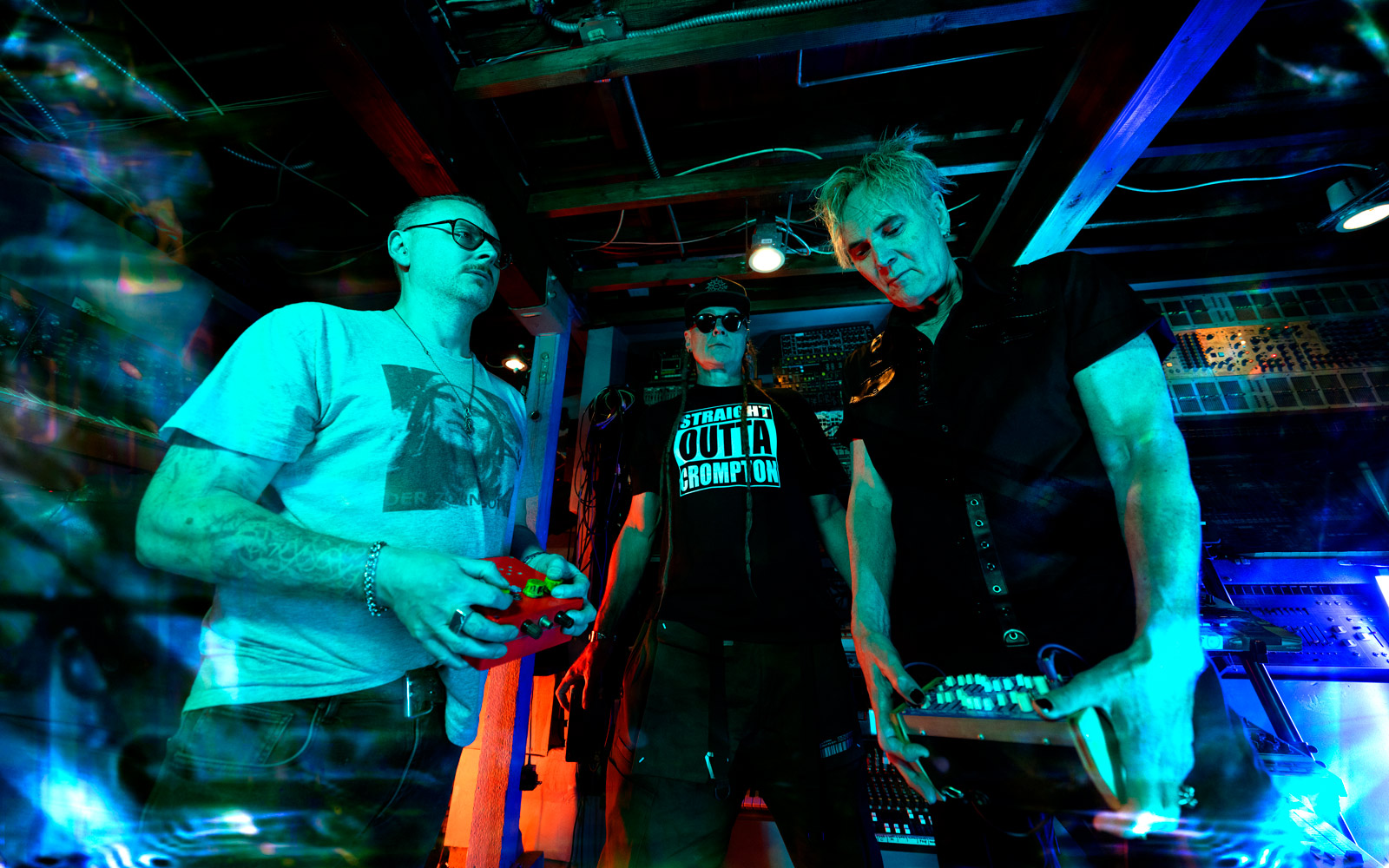 Photos by Ekaterina Gorbacheva and Simon Paul
Photos by Ekaterina Gorbacheva and Simon Paul
“This is pure Vancouver,” Cyberaktif member cEvin Key quips proudly of eNdgame, the band’s first album in 33 years. Mind you, the electronic musician is saying this from his home in Los Angeles, California, where he’s lived the past quarter century, but considering Cyberaktif comprises members of British Columbia-bred industrial icons Skinny Puppy and Front Line Assembly, it’s safe to say Key’s sentiment is more about the sound than a specific postal code. You can feel that foundational, retrofuturistic throb on eNdgame’s opening track, “A Single Trace,” which drips with the mud puddle squelch of synth-bass and menacing four-on-the-floors that began burbling out of the West Coast of Canada in the 1980s.
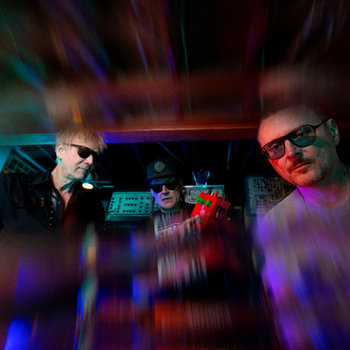
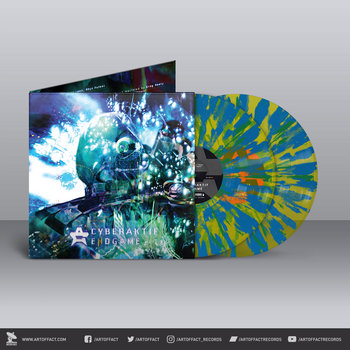
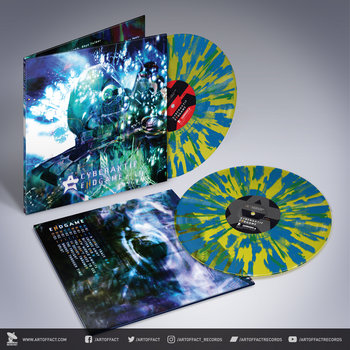
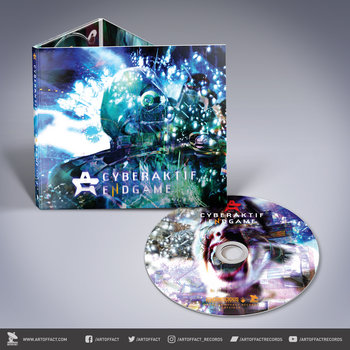


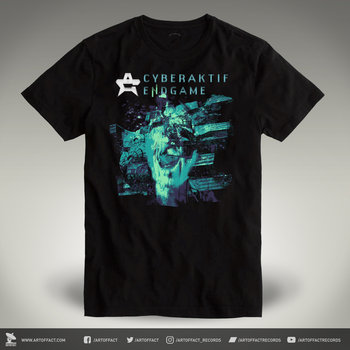

2 x Vinyl LP, Compact Disc (CD), T-Shirt/Shirt, Sweater/Hoodie




eNdgame reteams Key with Bill Leeb—the musicians played together in Skinny Puppy before Leeb created his own impactful legacy with Front Line Assembly. While Leeb’s longtime Assembly-mate Rhys Fulber is now a key collaborator on eNdgame, it was Skinny Puppy keyboardist/programmer Dwayne Goettel who helped Cyberaktif create 1991’s debut Tenebrae Vision during some downtime from their main gigs and litany of other side projects, including The Tear Garden, Delerium, Download, and Doubting Thomas. The return of Cyberaktif—a studio one-off that concluded just after the Tenebrae sessions—surprises even Key: “Have you ever heard of a band that made an album, and then 33 years later came back to make their second?” On a deeper level, it’s fitting Key made his way back to Leeb, whom he credits for steering him off a safer musical path.
Key met Leeb back in the late ‘70s while working a shift selling pens at Canadian department store Eaton’s. Though it’d be a few years before they started writing music together, the pair quickly began hanging out within Vancouver’s club scene, particularly as regulars at Luv-A-Fair, an underground club famed for hosting disco, punk, and eventually industrial events; Nine Inch Nails famously played to a light crowd during their Pretty Hate Machine tour. One night Leeb invited Key—then the electronic percussionist for a local synth-pop group called Images in Vogue—over to his apartment where he proceeded to throw down a playlist of beat-brutalizing, subversive electronic music that changed his friend’s artistic outlook forevermore.
“Bill was the inspiration for how Skinny Puppy got created, mainly by exposing us to the music that existed in the underworld at that time, like Throbbing Gristle, Cabaret Voltaire, and the rest,” Key says. “I mean, I was basically on a different trajectory with Images in Vogue. I’m glad that Bill slapped me one day and opened my mind.”
Not too long after, the two went out and bought a pair of Moog synthesizers. At another party, Key met raw-throated vocalist Nivek Ogre and promptly wrote a tune called “K-9,” essentially forming Skinny Puppy on the spot. Leeb, under the nom de plume Wilhelm Schroeder, joined up to add sinister synth rhythms to danceable terrorscapes like “Icebreaker” and “Cage.” Skinny Puppy built up a cult following locally and abroad, but Leeb bounced from the project when they started touring 1985’s Bites—he was succeeded by Goettel. Part of the reason for Leeb’s departure was the artistically productive yet personally acrimonious dynamic Key had with Ogre throughout the project’s existence.
“There was an intensity right away…I don’t think there was ever a time where it was just amicable,” Key explains, conceding diplomatically that while he’d like to think of himself as a “mega-chill” person, the tour vibes were oftentimes as confrontational as Skinny Puppy’s music. “I think Bill saw that coming on, so he got out and formed his own band.”
Founded in 1986, Front Line Assembly worked a similarly aggressive approach to North American industrial beatscaping. Fulber contributed to early demo tape Total Terror as a fresh-faced teen, and began going on the road with the band while still underage. “There’s no doubt that when I first met him, I thought, ‘Boy, this kid’s young’—he still had braces,” Key recalls. While Leeb had convinced the kid to quit high school, Fulber’s musical intelligence reflected a more intuitive pedigree. “The thing about that is his dad took him to see Kraftwerk when he was five, or something,” Key remembers. “He had very good training.”
By the late ‘80s, both acts were deep in heavy recording/touring cycles, so Leeb and Key rarely ran into each other, even while they were living in the same apartment complex. Skinny Puppy signed to Capitol Records in the U.S., which inched their hard-edged electro into the mainstream. Around the same time, Ogre befriended Ministry band leader Al Jourgensen, landing the Chicago industrialist a position producing Skinny Puppy’s guitar-flooded Rabies album in 1989. This was an especially contentious period for Goettel and Key, even beyond the usual tensions. “[Around] the time we finished Rabies, we thought for sure that Skinny Puppy was going to be no more,” Key explains, noting that Ogre had also integrated himself into Ministry’s live band at the time.

The uncertain future of Skinny Puppy, however, afforded Key time to reconnect with Leeb back in B.C. During a hangout session, Leeb called Wax Trax! Records, who’d released music for Front Line Assembly, and pitched the idea of himself, Key, and Goettel making new music for the label. Though Key was initially caught off-guard by the proposition, Cyberaktif quickly came together at the start of the ‘90s.






2 x Vinyl LP, Compact Disc (CD), T-Shirt/Shirt, Sweater/Hoodie




Tenebrae Vision’s sessions were less contentious than Rabies, but nevertheless yielded moments of chaotically arpeggiated, lyrically snarled-out electronic body music. Then again, Leeb delivers hope-drained, melancholic whispers amidst the depressively romantic dancefloor pulse of “Nothing Stays,” the album’s most enduring tune. Blixa Bargeld of Einstürzende Neubauten, whom Key had met when Skinny Puppy were co-curating a series of international performances at Vancouver’s Expo 86 World’s Fair, was brought on to croon a few lines on “Paradiessiets.” That sense of camaraderie soured when Skinny Puppy reconvened to cut 1990’s Too Dark Park. “I felt some animosity when we went back into the studio [with Ogre]—it wasn’t like [he was] giving us a hard time, but there was this weird energy. Even though there was this cross-pollination that had happened with Ministry, when we did something else, it felt like it was more of an issue.”
Despite this, Skinny Puppy fully threw themselves into a productive period that put Cyberaktif in the rearview mirror. Sadly, tragedy struck on August 23, 1995, when Goettel died of a drug overdose at the age of 31. Key, with whom Goettel had worked closely in the Tear Garden, Doubting Thomas, and Download, recalls his friend as someone who, despite the heavy electronics of each project, knew “how to integrate with sequencers…[but] not let the technology get the better of you.” Skinny Puppy released 1996’s The Process as a tribute to their fallen bandmate and went on a four-year hiatus; Key kept Download going. Cyberaktif remained a distant memory.
“That was probably the busiest period of Skinny Puppy’s history, between the making of Too Dark Park all the way to The Process, which ended at a recording session in Malibu in 1994. Up until when Dwayne passed on, it was pretty heavy. There was never a thought that I would make another Cyberaktif [record]…we never even had a discussion.”
The path back to Cyberaktif officially began about a decade ago, when Front Line Assembly and Skinny Puppy embarked on a joint tour in 2014; Leeb had pitched it as the “Monsters of Industrial Tour.” While Leeb had previously balked at the bad vibes of the Bites tour, spirits were higher here. He’d even jump around with Skinny Puppy to sing classic tracks like “Assimilate.” “That was the most fun that we ever had on tour, mainly because Bill was so much fun to be around,” Key recalls. “It created a completely different environment than the typical Skinny Puppy tour where nobody’s speaking.”
Shortly after the trip, Key started soundscaping new tunes he’d initially thought would end up on a new Skinny Puppy album, but the band’s productivity stagnated; their 2023 farewell tour marked their first live dates in six years. Funnily enough, that’s when Leeb once again came calling with a familiar opportunity, and this time he brought Fulber with him to fill out the trio. “When I could see that [a Skinny Puppy album definitively] wasn’t happening, and when Bill and Rhys [asked], ‘Might you have some ideas for a new Cyberaktif album,’ I thought to myself, ‘I certainly do!’”
Key built songs out at his L.A. studio before uploading folders of ideas for his bandmates to work on remotely in B.C. While often presented through the prism of impeccable modern production, the record still bears hallmarks of their collective musical histories. Take how Fulber built the echo-crunch snare work of “Broken Through Time” out of the old drum samples Key had incorporated into Skinny Puppy’s signature “Worlock”; Key says the triplet-style bounding of “You Don’t Need to See” also brings back “the old feelings” of “Assimilate.” It’s not all nostalgia, though, with Key praising Leeb’s subtly aching, occasionally-vocoded delivery on pieces like “A Single Trace” and “The Bitter End” as game-changing surprises from an old friend.
Having long folded snippets of horror movie dialogue into his many projects, Key sneaks in a reference to Godzilla on eNdgame’s “Broken Through Time.” Delivered by actor Raymond Burr—coincidentally born 13 miles east of Vancouver in New Westminster, B.C.—the line in question is a rather droll assessment of the King of the Monsters: “Look at the size of those footprints!” If there’s a slyly meta edge to the sample, Key’s keeping mum on that point.
“At the time, it was more that the snare and the kick sounded so huge on that song,” he laughs. “If we’ve left a dent as a result of this, and people say, ‘Hey, this is important to me,’ I thank those people for the support they have given us to exist.”







